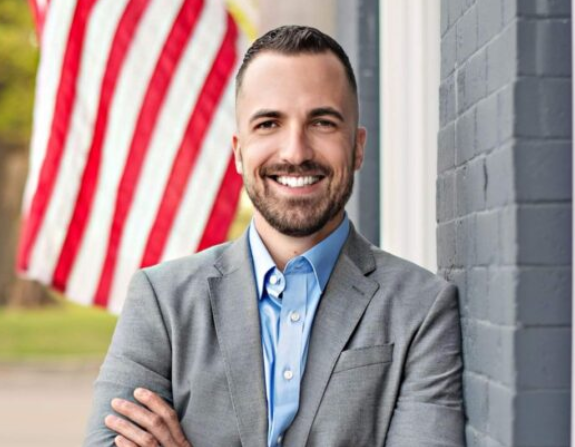Greetings Friends of the 155th District!
I cannot wait for the warmer weather to hit. After all the snow we have had this year and this past week, warmer weather cannot come quickly enough. I enjoy going to events that our constituents host in the district and I know as the warmer weather approaches more events will be planned. If you have an event that you would like me to attend, please contact my office.
Below are some of the bills that the House passed this week. I am pleased to announce that I have had a very successful week. I was able to debate and pass my HB68 which modifies the statute of limitations for personal injury claims from five years to two years. This bill now moves onto the Senate for further consideration.
Missouri House Passes Comprehensive Public Safety and Crime Reform Bill This week, the Missouri House passed HCS#2 HB 495, a comprehensive public safety bill addressing crime, policing, and penalties for various offenses across the state. A major provision of the bill establishes a new Board of Police Commissioners to oversee the St. Louis Police Department, effective August 28, 2025. This board will consist of four local citizen commissioners and the Mayor of St. Louis, giving it direct authority over the city’s police force.
The bill also includes new laws targeting criminal activities. It increases penalties for stunt driving and street takeovers, making repeat offenses felonies. The legislation strengthens child welfare protections by classifying first-degree child endangerment as a “dangerous felony,” particularly when fentanyl or similar drugs are involved. It also expands the definition of rioting and raises its penalties, eliminates the need to prove conspiracy, and allows for stricter sentencing.
Additional public safety measures in the bill include the creation of a “Committee on School Safety” within the Department of Public Safety to develop guidelines for preventing school firearm violence. It also requires law enforcement agencies to report the immigration status of criminal offenders to the state. Other provisions strengthen penalties for crimes such as burglary, organized retail theft, tampering with a water supply, and sex trafficking of minors. The bill further mandates that individuals convicted of intoxication-related traffic offenses install ignition interlock devices on their vehicles.
One provision allows law enforcement agencies to request assistance from agencies in other jurisdictions, including those from out of state. The bill also outlines how arrests by out-of-jurisdiction officers should be handled. Additionally, police vehicles used in certain undercover operations, such as surveillance or speed enforcement, will not be required to use audible or visual signals.
Proponents of the bill argue that it takes necessary steps to improve public safety by addressing serious crime, strengthening law enforcement oversight, and ensuring consistency in policing policies. They also highlight concerns about crime rates in St. Louis and the need for changes to police department leadership. Critics, however, caution that certain provisions may reduce local control, disproportionately impact marginalized communities, or increase government surveillance.
Having passed the House, HB 495 now moves to the Senate for further consideration.
—
Missouri House Passes Bill to Restrict State Funding for DEI Programs The Missouri House passed HB 742, a bill that restricts the use of state funds for diversity, equity, and inclusion (DEI) initiatives within government agencies. The bill prohibits state departments from spending taxpayer money on internal DEI programs, staffing, or initiatives that promote preferential treatment, collective guilt, or identity-based activism. However, it ensures that state agencies continue to follow federal and state anti-discrimination laws, including the Americans with Disabilities Act. The bill also prevents state departments from mandating or incentivizing private businesses to adopt DEI programs as a condition for receiving state contracts.
Supporters of the bill argue that taxpayer money should not be used to fund DEI initiatives that they believe are divisive or restrict free speech. They contend that DEI programs can foster exclusion rather than inclusion by emphasizing differences over shared values and that the government should remain neutral rather than mandating ideologically driven policies.
Opponents argue that DEI programs are essential for addressing historical and ongoing inequalities, ensuring fair treatment for all citizens. They believe these initiatives provide necessary resources and training to support underrepresented and marginalized groups. They also warn that eliminating DEI efforts could undermine progress toward more inclusive workplaces and communities. Prior to the passage of this legislation, Missouri Governor Mike Kehoe signed an executive order which would accomplish the same goal, mirroring an order signed at the federal level by President Donald J. Trump. Speaking on the floor, the bill sponsor explained that, while the executive order does accomplish the goal, the governor supports the passage of this legislation, as it would enshrine this in Missouri statute and prevent a future governor from overturning the executive order.
With its passage in the House, HB 742 now moves to the Senate for further debate.
—
Missouri House Passes Bill to Align Pesticide Warning Labels with Federal Standards This week, the Missouri House passed HB 544, a bill concerning pesticide regulations and labeling requirements. The legislation states that if a pesticide is registered by certain federal agencies or its labeling follows federal guidelines, it will meet any state law requirements regarding cancer warnings.
Supporters argued that glyphosate-based herbicides, one of the most widely studied products in the country, have been found safe when used as directed. They emphasized that multiple regulatory bodies in the U.S. and abroad have determined these herbicides are not carcinogenic and that this bill simply aligns state requirements with federal standards. They contend that the bill does not shield pesticide manufacturers from liability if their products are proven harmful.
Opponents, however, expressed concerns that the bill could protect pesticide companies at the expense of public health. They pointed out that studies used to determine pesticide safety are
often conducted by the companies themselves rather than independent government agencies. Some research has also shown conflicting results regarding the safety of glyphosate and other pesticides, raising questions about the reliability of the data used for federal approval.
HB 544 now moves to the Senate for further debate. If enacted, it would standardize pesticide warning labels in Missouri to align with federal regulations, potentially reducing additional state-level requirements.
—
Missouri House Passes Bill to Shorten Statute of Limitations for Personal Injury Claims This week, the Missouri House passed HB 68, a bill that changes the statute of limitations for personal injury claims. Under current law, individuals have five years from the date of an injury to file a lawsuit. This bill reduces that window to two years for injuries occurring after August 28, 2025.
Supporters of the bill argued that Missouri’s current five-year statute of limitations is longer than what most states allow. They note that 25 states have a two-year limit, and 16 states have a three-year limit. They believe this change will create a more business-friendly environment by reducing legal uncertainties, lowering insurance costs, and encouraging quicker resolutions of claims. Proponents also argued that shorter timeframes help preserve evidence and streamline the legal process.
Opponents, however, warned that the bill would unfairly restrict the rights of injured individuals. Some injuries or conditions caused by exposure to harmful substances may not be immediately apparent and often may take years to come to light. A shortened timeframe could prevent legitimate claims from being filed. Critics argued that the bill puts businesses and insurance companies before injured individuals. They also worry that the change could lead to an increase in rushed lawsuits, making litigation more chaotic rather than more efficient.
An amendment added to HB 68 includes language extending the statute of limitations for childhood sexual abuse claims. Under the amendment, survivors will now have 20 years after turning 21—or three years from the time they discover the abuse caused their injury or illness, whichever is later—to file a lawsuit. This change replaces the current 10-year limitation and provides survivors of abuse with more time to seek justice.
Advocates for survivors praised the amendment, noting that trauma and psychological barriers often delay the recognition of abuse-related injuries. They argue that the expanded time frame aligns with a growing national movement to provide greater legal recourse for survivors of childhood sexual abuse.
HB 68 now moves to the Senate for further debate. If passed, it would significantly shorten the time of legal action for personal injury claims, aligning the state with others that have stricter filing deadlines.
Nominate an Outstanding Educator for Missouri Teacher of the Year
Nominations are now open for Regional Teacher of the Year—the first step toward becoming Missouri Teacher of the Year! Anyone can nominate an exceptional educator, and nominations remain anonymous unless requested. The deadline to submit is April 14, 2025.
Each year, over 30 outstanding teachers are selected across the state’s nine Regional Professional Development Centers, plus the Southwest Center for Educational Excellence.
Missouri’s 2024 Teacher of the Year, Greg Kester, emphasized the honor of being nominated: “It means someone noticed the hard work teachers do—often without recognition.”
The Missouri Department of Elementary and Secondary Education will announce regional winners this summer, with the 2025 Missouri Teacher of the Year revealed in September.
Submit a nomination today through the Teacher of the Year nomination form.
If you ever have, any questions or concerns feel free to call me at 573-751-2042 or email me at Matthew.Overcast@house.mo.gov. Our office is always here for you.






